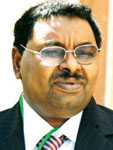
In late July, WikiLeaks unveiled new evidence that suggested Pakistani officials’ double-dealing as both an ally and enemy of the United States. The documents reveal that the Pakistani intelligence service supported the Taliban’s efforts to fight U.S.-led NATO forces in Afghanistan while receiving hundreds of billions of American dollars for its efforts against terrorism. Not surprisingly, the story captured headlines for days, including this New York Times editorial.
A double game of sorts is also taking place in Sudan, whose intelligence and security apparatus—The Washington Post’s Jeff Stein reminds us—also benefit from U.S. training and support. Though CIA support to Sudan’s intelligence arm appears to have aided U.S. counterterrorism efforts in Iraq and other terrorism hot spots, the strategy also has significant consequences for Sudan, most of which are at odds with the Obama administration’s stated policy objectives in the country.
Sudan’s National Intelligence and Security Services, or NISS, has played a central role in maintaining the current Khartoum regime’s hold on power. The organ acts as a blunt instrument for the regime, and in its assertion of control over the population, has committed massive human rights violations, war crimes, and humanitarian atrocities. The expansive security and intelligence apparatus is known for its use of brute force, torture, and harassment against perceived enemies of the state, including political opposition, independent journalists, and civil society leaders.
Members of the NISS, including former head Salah Gosh, helped direct mass atrocities in Darfur, and continue to fuel insecurity in the region by illegally smuggling arms to government forces, obstructing peacekeepers’ access to recent sites of violence, even carrying out attacks on the internally displaced population, according to the most recent U.N. experts report. The NISS has functioned as a paramilitary force in oil-rich areas—ones that are most prone to violence should diplomatic efforts between North and South Sudan fall apart. Today, NISS officials serve as Khartoum’s spies in South Sudan, where, according to conversations with SPLM officials, they liaise with dissident elements in the South. Southern officials believe that this sort of contact is the reason several militias have emerged in the region.
There is much less talk of the NISS’s role outside Sudan’s borders, but its agents have also played a pivotal role in Sudan’s relations with its neighbors. At the height of the Sudan-Chad proxy war in 2008, the NISS oversaw the supply system that funneled machine guns, automatic rifles, grenade launchers, vehicles, fuel, etc. from Khartoum to Chadian rebel groups, even working with opposition leaders on their attack strategy, according to a U.N. report from November 2008. Given this, it’s not hard to imagine that the NISS was also involved in Khartoum’s support to the Lord’s Resistance Army—a terrorist group by U.S. accounts.
In short, the United States is empowering an organization that has both a history of instigating conflict and insecurity in Sudan’s peripheries, and of spreading arms and instability outside of Sudan’s borders. This is at odds with the Obama administration’s hopes of finding a resolution in Darfur and implementing the peace agreement between the North and South; nor does it sit well with the goal of preventing terrorism from entering the region.
This CIA-NISS connection poses an interesting dilemma for the Obama administration as it pushes for a credible and fair referendum in South Sudan. With U.S. counterterrorism efforts shifting to the al-Qaeda network in Yemen and Somalia, it seems the U.S. government will depend more on its Sudanese assets. If so, what compromises will the Obama administration be willing to make to maintain this “highly valuable” ally as it enters into the eleventh hour of a stalled referendum process and an all-but-dead Darfur peace process?
Photo: Salah Gosh, former head of Sudan’s intelligence and security apparatus.

